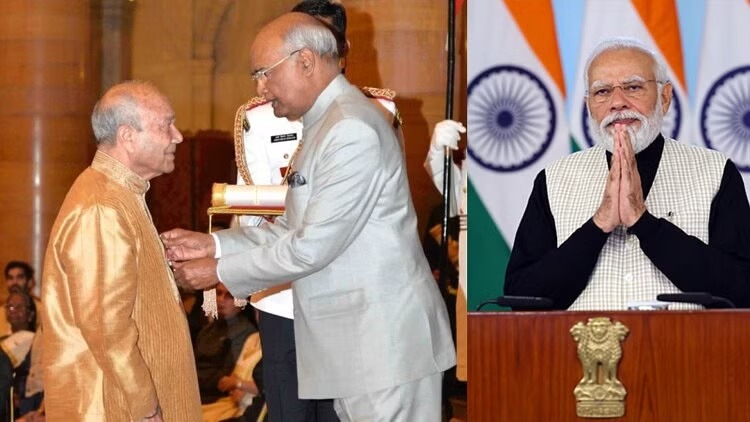In a profound loss to the legal community, Padma Bhushan awardee Professor Ved Prakash Nanda, a stalwart in the field of international law and education, breathed his last on January 2, 2024. Recognised globally for his exceptional contributions, Prof. Nanda’s impact on legal education resonated across borders.
Prime Minister Narendra Modi expressed his condolences on platform X, acknowledging Prof. Nanda’s invaluable contributions to the legal field and his unwavering commitment to legal education.
A distinguished Indian-American, Professor Ved Prakash Nanda received the prestigious Padma Bhushan award in Literature and Education on March 20, 2018. As a professor of International Law at the University of Denver, Colorado, he carved a significant niche in academia. His illustrious career included roles such as the Past President of the World Jurist Association, Honorary President of the Ved Nanda Center for International and Comparative Law, and advisory positions in esteemed institutions like the American Society of International Law and the United States Institute of Human Rights.
Prof. Nanda held notable positions, serving as the past president of the World Jurist Association and its current honorary president. Additionally, he was the former honorary vice president and counsellor of the American Society of International Law. His advisory roles extended to prestigious organisations such as the United States Institute of Human Rights. Notably, he served as the U.S. delegate to the World Federation of the United Nations Associations, Geneva, and vice-chair of its Executive Council.
Throughout his career, Prof. Nanda actively contributed to various organisations, serving on the board of directors of the United Nations Association of the United States of America. He currently held a position on its national council. Further, he was an elected member of the American Law Institute and served as a council member-at-large for the American Bar Association Section of International Law and Practice. Professor Ved Prakash Nanda’s demise marks the end of an era in the realm of international law and education.
In February 2004, Nanda received the “Gandhi, King, Ikeda Award for Community Peace Building” from Soka Gakkai International and Morehouse College. In 1990, he was honored with the “World Legal Scholar” award by the World Jurist Association in Beijing, China. Recognising his significant contributions, he was presented with the United Nations Association Human Rights Award in 1997. Furthermore, Nanda holds honorary doctorates from Soka University in Tokyo and Bundelkhand University in Jhansi, India.
A prolific writer, Nanda has an extensive publication record, with over 20 books on international law and more than 150 chapters and major law review articles. His expertise has led him to serve as a distinguished visiting professor and scholar at numerous universities in the United States and abroad.
He served as the Sanghchalak of Hindu Swayamsevak Sangh (HSS), America Zone.
In 2010, during a gathering at the Eola Community Center in Aurora, Professor Nanda addressed various pertinent issues faced by Hindus in America. He emphasised the imperative need for Hindu unity and the importance of selflessly working together while setting aside personal egos in a synergistic manner. Professor Nanda commended the significant contribution of Hindu thoughts and views across social, economic, and political spheres, highlighting the potential of Hindu ethos in fostering global peace.
He praised the work being done by individual organisations, temples, social groups but provoked the audience “what are we doing as a collective-united team?”
While acknowledging the commendable efforts of individual organisations, temples, and social groups, Professor Nanda challenged the audience to consider their collective and united impact. He shared insights into the responsive actions of Hindu society and HSS USA in aiding Bhutanese Hindu refugees during their resettlement in the United States, applauding the work of organisations such as Sewa International, VHP, and others.
In his articulate speech, Professor Nanda underscored the necessity of encouraging the younger generation to explore fields like education, social sciences, journalism, and political sciences. He particularly praised the noteworthy achievements of Hindus in research, medicine, engineering, and information technology.
During the meeting, Professor Nanda posed thought-provoking questions, questioning why esteemed Hindu scriptures like the Ramayana and the Mahabharata are not integrated into the U.S. education system. He emphasised the absence of a prominent place for the profound Hindu values within societal and institutional frameworks. Professor Nanda highlighted that Hindus were pioneers in contemplating ecological and environmental issues, yet these perspectives are not widely discussed in mainstream society.
Expressing concern, he pointed out that the Hindu ethos of respecting all beliefs and showcasing great tolerance over thousands of years often goes unnoticed and unacknowledged in contemporary discourse. Professor Nanda shared a significant encounter with H.H. Dalai Lama in Dharamshala, India, quoting the spiritual leader’s remarks that India is his Guru, a Punyabhoomi, and the values propagated by Hindus are invaluable contributions to humanity as a whole.


















Comments